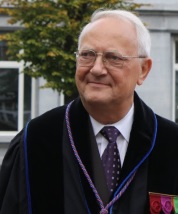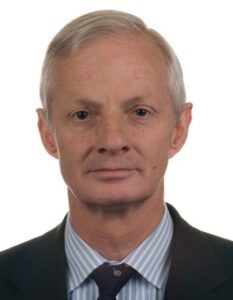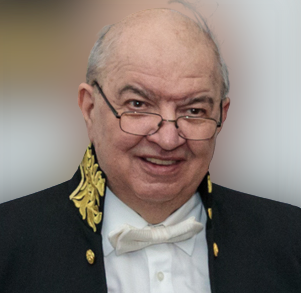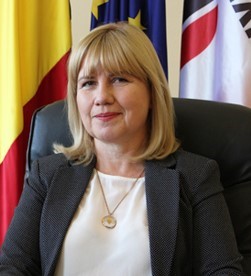Keynote Speakers for ISMCR 2023
Prof. Yvan BAUDOIN1 and Col. Dr. Jean MARSIA2
1Board Member of the International CBRNE Institute
Professor emeritus of the Royal Military Academy
Homepage: www.ici-belgium.be
E-Mail: Yvan.baudoin@ici-belgium.be
2President of the European Society for Defense
Homepage: www.seurod.eu
E-Mail: Marsia.jean@gmail.com

Professor Emeritus Yvan BAUDOIN is the former Head of the Department of Mechanical Engineering and former Executive Director of the Unmanned Vehicle Centre (http://mecatron.rma.ac.be) at the Belgian Royal Military Academy (RMA). He has an extensive experience in coordinating large consortia at the international level such as the IARP working groups HU(manitarian)DEM(ining) (22 partners), RI(sky)S(urveillance)E(nvironment) (18 partners), the NATO/STO/ TG 175 focusing on intelligent assistance for autonomous vehicles (23 partners).
Prof. Em. Baudoin coordinated a EUREKA project (E!3517 – Towards a European Network of Environmental Engineering Sciences and Techniques) in which 164 SMEs and Academic Institutions from across Europe participated). He was also Co-Coordinator of the FP7-TIRAMISU (www.fp7-tiramisu.eu) project focusing on Humanitarian Demining and Liaison Officer in the FP6 View-Finder project (more than 32 Fire-Fighting/Civil Protection Services in Europe).
Prof. Em. Baudoin coordinates the Explosive and Robotics Knowledge Centre of the International CBRNE Institute located in Belgium. He also acts as vice-chairman of the IMEKO-TC17 (Robotics) – www.imeko.org.

Colonel Dr. (retired) Jean MARSIA has been academic director at the Belgian Royal Military Academy (RMA) from 2003 until 2009. After his retirement, he became a PhD candidate at the Brussels Free University. From January 2013 to October 2014, he served as the Defence Advisor to the Belgian Prime Minister. On the 7th of September of 2015, he successfully presented his PhD thesis and became Doctor of Political Sciences at the Free University of Brussels, and doctor in the Social and Military Sciences at the RMA. Since the end of November 2015, Jean Marsia has worked as the president founder of the European Society for Defence, an international non-profit association with the main goal of reviving the political union of Europe and achieving an effective European Defense within the NATO.
Keynote Presentation
Robotics assistance in risky or conflictual situations: may the European Defence effectively contribute to such aims?
Abstract
The Royal Military Academy was coordinating two European Projects , one focusing on Humanitarian Demining, the other one on Search and Rescue Operations, both projects intending to exploit the improved performances of Robotics Systems, Unmanned Aerial Vehicles (UAV) in particular and Unmanned Land-vehicles or UGV. The International CBRN Institute is now involved in a European funded research focusing on Cross Border interventions when a disaster implies such vehicles equipped with specific CBRNE sensors.
The drones are characterized by an increasing development and use in the military sector for combat, combat support and logistic missions, as well as in the civilian sphere, essentially focusing on Environmental Surveillance and Security missions: The well-known acronym RSTA summarizes those missions: RECONNAISSANCE, SURVEILLANCE, TARGET ACQUISITION.
The UGV are still prototypes and regularly tested through competitions like ELROB (www.elrob.org).
The presentation will be completed by an evaluation of the current investments in Unmanned Vehicles and the current status of the European Defense.

Prof. Karsten BERNS
Chairman - Robotics Research Lab, University of Kaiserslautern, Germany
Robotics Research Lab
Department of Computer Science
University of Kaiserslautern, Germany
E-Mail: berns@informatik.uni-kl.de
Homepage: http://agrosy.informatik.uni-kl.de
Prof. Karsten BERNS has studied computer science with a special focus on artificial intelligence at the University of Kaiserslautern (1982 to 1988). For his research on "Neural Networks for the Control of a six-legged Walking Machine" he received his PhD from the University of Karlsruhe in 1994. As head of the IDS (Interactive Diagnosis and Service Systems) department of the Research Center for Information Technology (FZI), Karlsruhe (till 2003) he examined adaptive control concepts for different types of service robots. Since 2003 he is a full professor at the University of Kaiserslautern.
Present research activities are the realization of reliable, complex autonomous robotic systems. Therefore, he and his research group are developing the robotic middleware Finroc, the behavior-based control architecture iB2C as well as different validation and verification methodologies. The main application is off-road robotics, in which autonomous or semi-autonomous vehicles like small a truck, an excavator, a shuttlebus, tractors, and rescue robots are under development. In the range of humanoid robots, the social robot ROMAN, ROBIN and EMAH is developed for the investigation of human robot interaction. Also a biological inspired biped locomotion is under development including soft actuators and the mechatronics system of the biped.
Prof. Berns is frequently reviewer and associated editor of several journals and robotic conferences like ICRA, IROS, Humanoids. Furthermore, he is editor of the ELSEVIER journal Robotics and Autonomous Systems a member of a number of editorial boards. He also acts as reviewer for several national and international funding organizations. He was general chair of several national and international conferences. He is member of the IEEE and the Gesellschaft für Informatik (GI).
He is a member of the executive committee of the German Robotics Association (DGR) and is leader of the technical committee for robotic systems of the GI. He was Dean of the department of computer science at the University of Kaiserslautern (2007 – 2010) and was member of the scientific directorate Schloss Dagstuhl - Leibniz Center for Informatics (2008- 2014). From 2010 till 2020 he was spokesperson of the Center for Commercial Vehicle Technology (ZNT) at the University of Kaiserslautern and the Commercial Vehicle Cluster, Kaiserslautern.
Keynote Presentation
Autonomous Shuttle for Pedestrian Zones
Abstract
In recent years, a large number of projects have been carried out with the aim of developing semi-autonomous shuttles for inner-city areas. In most cases, the experiments were carried out with predefined pathways for the shuttle and with a safety driver. In contrast to these projects, a shuttle was developed at the RRLab of the RPTU Kaiserslautern-Landau, Germany to perform transportation services in busy pedestrian areas. Aim of the project is that the shuttle should perform the transportation in a safe and fully autonomous manner. The talk will address how such a shuttle for pedestrian zones can be developed from the embedded systems side, how basic control and environmental perception must be designed to guarantee safe navigation. Furthermore, interaction mechanisms between shuttle and pedestrian will be presented to enable a fluent driving even in very crowded areas. Based on several experiments the performance of the system will be presented.

Prof. Daniel CONDURACHE
Professor Emeritus, “Gheorghe Asachi” Technical University of Iasi, Romania
Department of Theoretical Mechanics
“Gheorghe Asachi” Technical University of Iasi
E-Mail: daniel.condurache@tuiasi.ro
Homepage: https://www.ac.tuiasi.ro/~dcondurache/
Professor Emeritus Daniel CONDURACHE is the former Head of the Department of Theoretical Mechanics and Vice-Rector of “Gheorghe Asachi” Technical University of Iasi, Romania. He is member of the Romanian Academy, Senior Member AIAA (American Institute of Aeronautics and Astronautics), Senior Member IEEE (The Institute of Electrical and Electronics Engineers-USA), Senior Member IEEE Robotics and Automation Society, Senior Member IEEE Aerospace and Electronic Systems Society, Member AAS (American Astronautical Society), Member ASME (American Society of Mechanical Engineering), Member AMS (American Mathematical Society USA), Founding member of Romanian Society of Theoretical and Applied Mechanics. Being currently a member of the Technical Committee for Computational Kinematics of the International Federation for the Promotion of Mechanism and Machine Science (IFToMM). His research fields are Algebraic and geometric methods in dynamic systems, Astrodynamics, Satellite formation flying, Orbital mechanics, Integral transformations on hypercomplex spaces, Wavelets analysis, Lie group and Lie algebra in Robot computational kinematics and dynamics.
He gave lectures and conferences in the USA, Canada, Peru, Mexico, Spain, Portugal, Italy, Israel, France, Germany, Slovenia, Croatia, Czech Republic, Poland, Russia, China, Taiwan, and Australia.
Keynote Presentation
Advances Representation of Higher-Order Kinematics of Motion. Hypercomplex Lie Groups and Lie Algebras.
Abstract
The displacement and motion representation of rigid bodies and multibody systems is one of the principal issues in different research domains like robotics, theoretical kinematics, computer vision, astrodynamics, etc. Higher-order acceleration is crucial in robotic mechanical device design, kinematics, and real-time control. Acquiring higher-order acceleration, typically for accurate trajectory tracking, requires computing higher-order derivatives. In practical applications, desired end-effector trajectories with higher-order continuity and precise control need feedback on high-order joint positions and accelerations. The resulting symbolic expressions are obtained via calculations concerning twist space or in body twist repositories. Using dual Lie algebras of Lie group of orthogonal dual tensor and the problem of finding the field of high-order accelerations is a previous works' results. The methods have been extended for commutative multi-dual and hyper-multi dual algebras. This paper extends the previous results and proposes a new set of hypercomplex Lie groups and this Lie algebras. A new product of exponential formulas is demonstrated for high-order accelerations field of motion and lower-pair serial kinematic chains.

Prof. Doina PISLA
Director- Research Center of Robots Simulation and Testing, Technical University of Cluj-Napoca, Romania
Research Center for Industrial Robots Simulation and Testing.
Technical University of Cluj-Napoca
E-Mail: doina.pisla@mep.utcluj.ro
Homepage: https://cester.utcluj.ro/
Prof. Doina PISLA is currently the Director of Council for University Doctoral Studies within the University of Cluj-Napoca, Romania and the Director of the Research Center for Robots Simulation and Testing (CESTER) within the same university.
She obtained her PhD within the Technical University of Cluj-Napoca in 1997. Following an academic carrier, she became full professor at the Department of Mechanical Systems Engineering in 2005, teaching lectures in Parallel Robots and Medical Robotics.
Prof. Pisla’s research activity is focused mainly on the field of Robotics and Mechatronics, with emphasis on the kinematics and dynamics of parallel robots, development of innovative medical robots, intelligent systems, reconfigurable structures. As a result of her scientific activity, Prof. Pisla published over 200 peer-reviewed full papers in scientific journals and conferences, co-authored over 10 patents.
As a high recognition of her outstanding scientific results, Prof. Doina Pisla received the most prestigious Romanian Academy Award, namely “Traian Vuia” Award in 2022. She has been director or key member of more than 50 international and national projects. In the meanwhile, she served in boards and program committees of various international
conferences and congresses, being currently member of the Technical Committee for Computational Kinematics and for Biomechanical Engineering of International Federation for the Promotion of Mechanism and Machine Science (IFToMM).
She serves also as reviewer in various journals and funding agencies and Editor of the Series “New Trends in Medical and Service Robotics” (Springer).
Keynote Presentation
Recent Advances in Medical Robotics
Abstract
Rehabilitation robotics is one of the most important subdomains of the medical robotics, with a highly potential worldwide, and its development is correlated with the increased life expectancy and the growing number of elderly persons. The already achieved robotic systems for rehabilitation of upper and lower limbs have shown a continuous evolution in this challenging and difficult research field.
Stroke is one of the leading causes of motor disability and a post stroke patient must undergo rehabilitation exercises to gain back its ability to perform daily life activities. The main problem here is that in the future, more precisely in the next 20 years, there is a crisis projected because the incidence of stroke will rise due to the ageing of the population and the survival rate of stroke will also increase due to medical innovation, which in turn will lead to an increased number of post stroke patients relative to the number of kineto-therapist, creating an unbalance in the healthcare system. Therefore, it is important to develop innovative robotic systems which allow physical therapists to develop patient-oriented rehabilitation programs that can maximize the therapeutic effects aiming towards an increased quality of life in the framework of Activities of Daily Living.
Iasi, Romania
September
21 – 22, 2023
Messages from Chairs